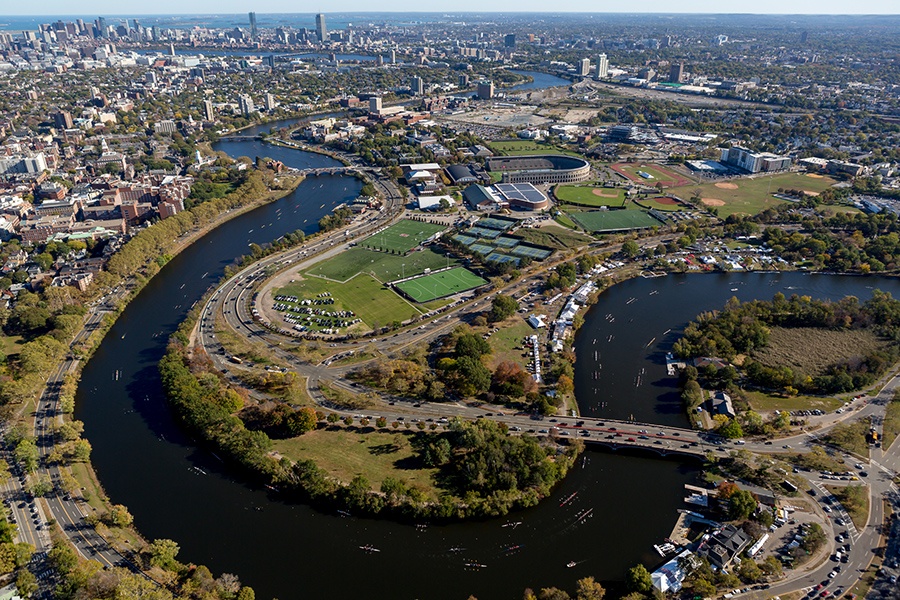Get Ready to Row: Anyone Can Race in the Head of the Charles Regatta This Year
The two-day event, normally held on the Charles River, will now be a global remote experience. And yes, you can participate.

Photo by Adam Glanzman
Countless events in Boston have been canceled this year due to the COVID-19 pandemic—including, but not limited to, the Boston Calling music festival and the Fourth of July fireworks. Even the Boston Marathon has had to pivot to a virtual race. So it was almost inevitable that the Head of the Charles Regatta, a two-day rowing event drawing hundreds of rowers and spectators to Boston every October, would be similarly suspended. And yet, after the HOCR board of directors made the final decision on July 15 to cancel the 2020 installment of the beloved race, we had to process another wave of grief and sadness all over again.
Here’s some good news, though: We’ll still be able to experience some of the joy and camaraderie that the regatta brings. This year, the HOCR board has decided to create a global remote regatta, available and accessible to all athletes who have some type of boat or rowing machine.
That’s right. You don’t have to be an elite athlete to compete this year, and you don’t have to be on the banks of the Charles River to watch—you can compete, spectate, and cheer on others from the comfort, and safety, of your own home.
“The decision to cancel the race came after listening to many different voices, including the race committee and people on the ground running the race,” says Fred Schoch, executive director of the Head of the Charles Regatta. “In addition, we consulted public health professionals and epidemiologists at Massachusetts General Hospital.”
Schoch says the options these health professionals laid out would have involved only two percent of the community the HOCR normally serves during the race. “And that’s not the point of the Regatta,” he says. “We want to serve the entire rowing community.”

Photo provided by Head of the Charles Regatta
“Everyone is always excited to come to Boston to row in this race,” adds Mason Cox, assistant director of the HOCR. “We wanted to replicate that into a global remote event.”
He explains that the event will have two main components: A participatory component and a competitive component.
The participatory component will take place throughout the week leading up to the race’s original date, October 17. During this period, rowers around the world will submit their race times (by water or machine) for completing the full distance of the HOCR: 4,702 meters. “Obviously this is participatory in the sense that water conditions will be different all around the world, but it will get as many people as possible on the water competing,” Cox says. All times will go onto a public leaderboard.
The competitive component, meanwhile, will only take place on October 17 and will be broadcast on the HOCR’s YouTube channel—complete with live-streamed announcers. How this will be done? Cox says rapidly-evolving technology will allow organizers to connect rowing machines from across the world, even incorporating live footage as competitors race “against each other.” The race directors are still finalizing the details, and a full itinerary will be released in August on the HOCR’s website, but Cox says his understanding is that everyone who has a Concept2 ergometer—a brand of rowing machine—will be able to set up the live-streaming platform with a phone or laptop and race against others. Again, anyone is qualified to race.
In fact, having rowed on the Charles just once, which taught me how hard the real HOCR course is, I had to ask: Can even I race? Schoch and Cox chimed in with an exuberant answer over the phone: “Yes! We hope you do!”
What’s more, all entry fees for the virtual races (likely $25, according to organizers) are going to a new fund to support rowing programs that serve under-resourced youth and communities throughout the United States. The fund is in partnership with the Gold Cup of Philadelphia, and it hopes to provide $100,000 in seed capital to launch the effort. According to a press release, the fund will also provide in-kind equipment and mentoring services that will allow the programs to field competitive teams of youth aged 19 and under.
At the end of the day, Schoch says the community has been supportive of the HOCR board’s decision to cancel the in-person race. “We want to keep people safe until we get through this, and then bring everyone back to Boston in 2021,” he says.
After all, whether on the water or a machine, you can’t keep rowers from doing what they love. “Rowers train regardless, whether there is a race on the schedule or not. We do it for physical health and we do it for mental health,” says Schoch, who even rowed in the rain on the day we spoke. I couldn’t think of a more perfect example of making the most out of life, even under subpar conditions. Thankfully, during a global pandemic, silver linings and community connectedness are exactly what the HOCR is offering to everyone this year—whether you’re an elite athlete or not.

Photo by Adam Glanzman


